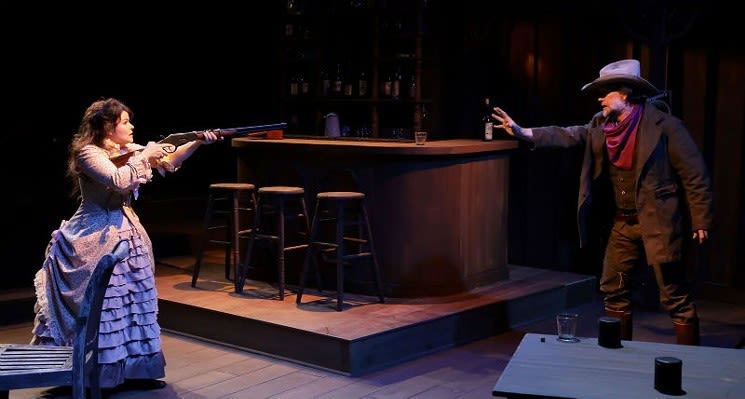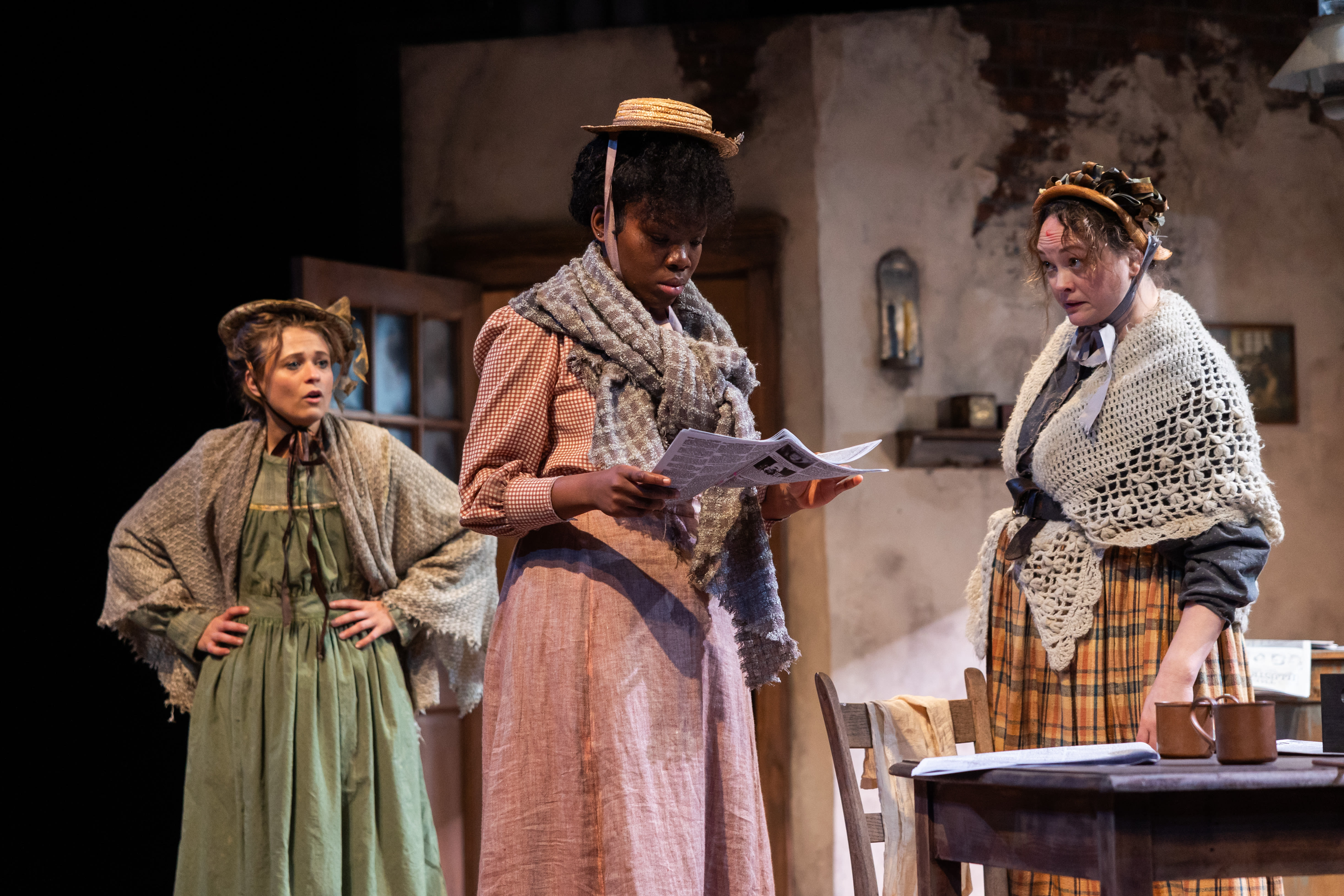Review: Liberty Valance Revives the Tired Western Genre for an Unexpected Stage Success

Bree Welch as Hallie Jackson, Josh Morrison as Bert Barricune
Image: Amitava Sarkar
During my childhood, few things inspired a more visceral loathing than the Western stage melodramas popular at some of our town’s smaller theaters, cringe-worthy shoot-em-ups in which audiences were encouraged to cheer heroes and boo and throw popcorn at mustache-twisting villains. Not content to cause minor discomfort, at one performance I threw pennies instead.
That ancient rage, long dormant, suddenly returned when I entered Stages Repertory Theatre for a performance of The Man Who Shot Liberty Valance, a 2014 theatrical adaptation of the short story, by Dorothy M. Johnson, that also gave rise to John Ford’s 1962 (alleged) cinematic masterwork of the same name. On stage I saw the same ersatz, small town saloon present in every B-movie, complete with wagon wheel motifs and dusty stools. My discomfort only increased when the lights went down and the parade of paraphernalia began—the guns, the holsters, the boots, the hats, those damn mustaches.
However, proving once again that anything is possible in the theater, aversion soon left me. Five minutes into Liberty, my resistance faded and mood lifted. Ten minutes into it, I found myself utterly captivated by its tale of outlaw treachery and vigilante justice. After a quarter-hour, I even slipped a heavy handful of pennies back into my pocket.
For this rawhide reversal, I credit Stages’ assured production and superlative cast, as well as Jethro Compton, a name that would seem to signal a Dogpatch pedigree but refers instead to a young Englishman, a playwright with a preference for movies over theater, a 28-year-old who never shot a gun in his life until last Sunday (during his first trip to Texas, naturally).
But craftsmanship is a great compensation for inexperience, and Compton is a craftsman. His Liberty is a well-made play from start to finish, its architecture so impressive, even the most reluctant may feel compelled to saddle up and ride along. A second secret to the play’s success, as I say, is the cast and crew who bring it to life, and a third is serendipity. Compton’s work has arrived at just the right moment. In darkish times like these, with the forces of brutality perpetually threatening to vanquish the rule of law, sitting and watching a classic western—a genre devoted to the reverse—feels nothing if not therapeutic.
And Liberty is nothing if not a classic western. At rise, we meet hardscrabble Hallie Jackson, who has dedicated her life to a different den of lawlessness, namely the Prairie Belle saloon she inherited. Hallie’s only companion in the world, it seems, is Jim, a black man whom her family took in as a child, and who functions as a sort of bar back/sidekick. Into this somewhat anachronistic milieu (the Jim character is an invention of the playwright), arrives a man named Ransome Foster, who is carried into the bar bloodied and unconscious. He was attacked by the vicious Liberty Valance and his posse, we learn, after Foster tried to intervene on behalf of a black man being tortured at their hands.
A revived Foster tells us that he is a learned man from the east (“books are my friends and family,” he says). He is a do-gooder of the spineless variety, a shaky gun who must somehow conjure up his manhood and stand up to the vile, murderous Valance. Along the way, he endeavors to bring both civilization and civility to the West, quoting Shakespeare as he teaches Jim and Hallie to read before falling in love with the latter and clashing with Bert, the man who owned her heart (sort of) prior to Ransome’s arrival.
It’s a deadly scenario, I grant you, but trust me, the show is anything but. This is due in no small part to Liberty’s cast, all of whom dig for the truth beyond cliché. As Hallie, Bree Welch manages to bring warmth and dimension to a woman who might have studied elocution under Annie Oakley. Notwithstanding differences of accent and background, her romance seems real with Ransome (sturdy David Matranga at the performance I saw—more on that below.)
Atseko Factor, who embraced the show’s most dangerous acting challenge in playing the grinning, floor-mopping Jim, turns in what is arguably its greatest performance. But as Hallie’s lovesick ex Bert, Josh Morrison has obstacles to navigate too—as when he clumsily presents Hallie a bouquet of cactus flowers. Still, his performance skillfully avoids the stereotypical. And as the satanic Liberty, Adam Noble needs nothing more than an ugly facial scar and a milky eye to sketch a believable portrait of evil incarnate, which I hope the actor takes as a compliment.
Credit too must go to the superb direction of Stages artistic director Kenn McLaughlin, whose Liberty is an absorbing experience that builds to a surprisingly powerful climax. It even contains elements of the experimental. At some performances, Noble and Matranga play hero and villain, while at others they swap roles. (Stages offers half-price tickets to theater patrons who want to compare experiences and see the show a second time.) Like Ransome, McLaughlin brings poetry, intelligence and a sense of mission to the Old West. And nothing confirms this more than the final image of the play, which he has fashioned along with set designer Jody Bobrovsky (whose saloon, despite my initial reservations, turned out to be a perfect play space). It’s an image too good to spoil, one that offers a sobering comment on the country we’ve been and the one we might become.
Through June 25. From $21. Stages Repertory Theatre, 3201 Allen Parkway, Suite 101. 713-527-0123. stagestheatre.com




